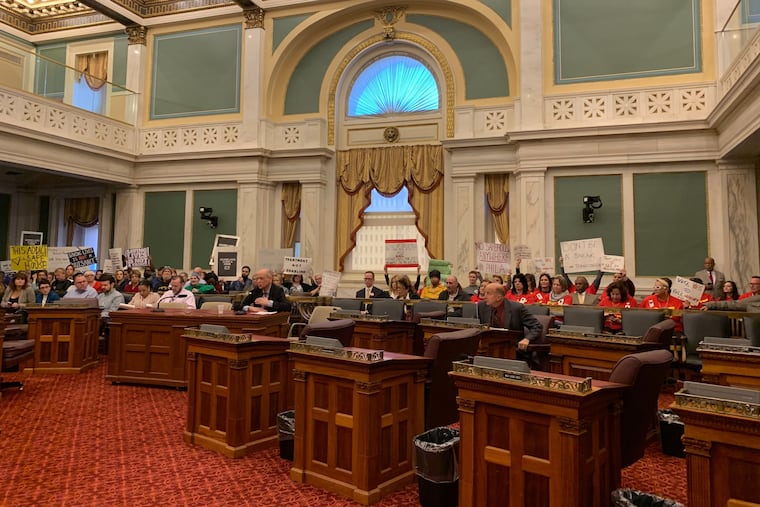Could Philly City Council block supervised injection sites? Legislation advances out of committee.
The bill would require 80% of residents and businesses in a half-mile radius to approve of the opening of a supervised injection site. It now goes to the full Council for a final vote.

Advocates for supervised injection sites held signs with sayings such as “Dead people can’t recover.” South Philadelphia residents wore matching red T-shirts reading: “Stand up South Philly and take our streets back."
And dozens of residents on both sides of the issue applauded, shouted, and jeered in City Council chambers Monday, at times growing rowdy enough to disrupt testimony during a committee hearing.
Nearly five hours after the public hearing began, a Council committee voted 4-2 to ask all 17 lawmakers to consider legislation that would require the approval of 80% of residents and business owners within a half-mile radius of a proposed site — a measure that critics said would essentially doom supervised injection in Philadelphia.
Monday’s emotional hearing and vote continued the fallout for Mayor Jim Kenney and Safehouse, a nonprofit formed to open supervised injection sites, after last month’s sudden announcement — and quick cancellation — of plans to open the nation’s first site.
It also showcased Philadelphia’s division on the issue. The crowd gathered Monday in City Hall appeared equally split between supporters who believe supervised injection sites would save lives amid the opioid epidemic and those who fear they’d only bring drug dealers, crime, and more overdose deaths to their neighborhoods. People who are in addiction recovery or who have lost children to overdoses spoke on both sides of the debate.
“I’m hearing a lot about process, process, process,” testified Bonnie Milas, a doctor who lost both of her sons to overdoses. “We’re going to get bogged down in the process and … in that period of time people are dying.”
Divisions also exist among Council members. While several members, including Council President Darrell L. Clarke, have voiced opposition to such sites, Councilmembers Helen Gym and Kendra Brooks voted against advancing the bill out of Council’s Committee for Public Health and Human Services.
It will now go to the full Council for a final vote.
Kenney, who has the power to veto the bill, has vowed to continue his support of supervised injection sites. Health Commissioner Thomas Farley said the legislation would create “insurmountable obstacles” to opening them.
“These sites save lives and we want to open these sites as quickly as possible so we don’t lose lives unnecessarily,” said Farley, who also serves as a member of Safehouse’s advisory committee.
Councilmember David Oh, who introduced the bill, said the committee amended it Monday to reduce the required percentage of buy-in from residents and business owners from 90% to 80%, and cutting the area that would get veto power from a radius of one mile to a half-mile.
“It’s a symbolic change,” Oh said, adding that he would welcome suggestions from the Kenney administration or others.
Mike Dunn, a Kenney administration spokesperson, said the amendment does not change the administration’s opposition to the bill.
“The measure is nothing but a thinly-veiled attempt to ban overdose prevention sites, while hiding behind an impossible-to-comply-with public process,” he said.
Councilmember Maria Quiñones Sánchez said she had some concerns about Oh’s bill. But she accused Farley and the administration of hypocrisy for asking Council to slow down its consideration of the legislation.
“You’re telling us ‘Hold up, we want a process’ when you didn’t give us a process" before seeking to open the first site, she said.
Rose Candelora, a South Philadelphia resident, said she has lost family members to drug addiction but testified that a supervised injection site would only be “adding to the problem.”
“We should be allowed to have a say and ask pertinent questions about the operation of a facility,” Candelora said.
Both supporters and opponents of supervised injection sites, however, appeared to agree on the need for better treatment options. And even some advocates noted that they would like to see more community engagement before one opens.
“I do believe that the community needs to be engaged,” said Bill Kinkle a healthcare professional who also is recovering from addiction. But, he added, the bill as proposed “shuts out really any conversation."
» READ MORE: Supervised injection site in South Philadelphia will not open — at least for now
Ronda Goldfein, Safehouse’s vice president, did not speak at Monday’s hearing, but said afterward that the nonprofit opposes the bill.
“We heard the strong voices at today’s hearing support overdose prevention services and oppose a bill drafted to be an absolute veto and not a solicitation for public input," she said.
Council passed a resolution last week, also sponsored by Oh, condemning the city and Safehouse for the stealthy rollout of its now-canceled plans, which caught neighbors and officials by surprise; it also urged a freeze on planning for future sites.
» READ MORE: After surprise announcement — and cancellation — of Philly’s supervised injection site, advocates haven’t given up
Gym, who voted against that resolution as well as against advancing the legislation Monday, urged residents to learn more about how supervised injection sites work.
“There’s a tremendous amount of confusion, ignorance and fear about things that we don’t understand," she said.
Councilmember Isaiah Thomas said he did not like that the bill refers to supervised injection sites as “nuisance health establishments.” But, after last-minute whispered negotiations, he joined three of his colleagues — Councilmembers Cindy Bass, Bobby Henon, and Oh — in advancing the bill.
“Unfortunately my concern about the language," Thomas said, “does not override the need to send the administration a message that … nothing should be done in neighborhoods without talking to people."
Staff writer Aubrey Whelan contributed to this article.
Ronda Goldfein of Safehouse is married to David Lee Preston, an editor at The Inquirer. He is not involved in coverage of this story.